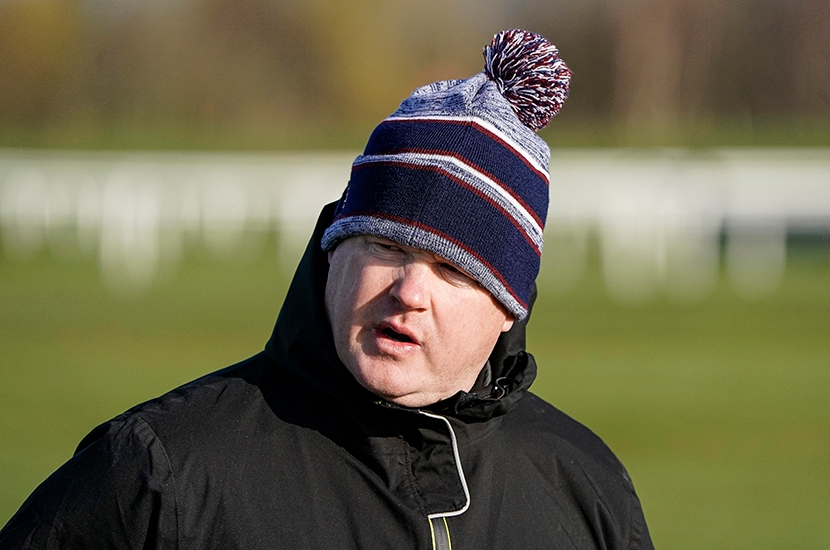Thanks to Covid, there could be no spine-tingling roar at the Cheltenham Festival this year as the first race runners set off, no exultant crowds lining the rails from the finish to the winners’ enclosure to cheer their sweaty heroes. Twitchy racing officials will have watched with their gaze half averted for fear that equine fatalities or excessive whip use by jockeys desperate to extract the last ounce of effort from their mounts will have swelled the chorus of the sport’s opponents and would-be eradicators. Publishing schedules mean that I must write before a Festival race is run, but I have no doubt that the week will have been dominated in many minds by the Man Who Wasn’t There.
It would be difficult to overstate the harm done to the sport by the photo circulated on social media of Co. Meath trainer Gordon Elliott making a phone call while sitting on the body of the seven-year-old Morgan after the horse died of a heart attack on his Cullentra Stables gallops. It was an act of utterly callous stupidity. Elliott rapidly admitted that he had let down the whole racing industry and that ‘whether dead or alive, the horse was entitled to dignity’.
It is difficult to overstate the harm done to the sport by the crassly insensitive photo of Gordon Elliott
But his is not a shoestring six-horse yard on the fringes. Just coming into his prime at 43, Elliott is already at the pinnacle of his sport: his 1,838 winners include three victories in the Grand National, two of them with Tiger Roll, the best-known horse in training. He has won a Cheltenham Gold Cup and been champion trainer at the Cheltenham Festival and what is so damaging about what Elliott is now himself calling ‘an indefensible… moment of madness’ is that he has undermined the argument that nearly all of us in racing use to justify our sport: that the animals whom we ask to race for our entertainment, with the risk that a few will pay the ultimate penalty of death, will along the way live a life of comparative equine luxury surrounded by love and given true respect.
As the great and now retired trainer John Oxx puts it: ‘Horses are like people. They have to be looked after like children to reach their potential.’ What Elliott’s moment of crass stupidity did was to give racing’s opponents force in questioning the sincerity of our arguments. There were clearly others around — notably the taker of the photograph — who found the sight of him astride poor dead Morgan amusing and that raises questions about attitudes to the living too.
I have visited dozens of racing stables and I have no doubt about the love and respect with which stable staff treat their charges. I will never forget doing the night-time stable run with that brilliant horseman Clive Brittain. Every horse stirred from the darkness to come and greet the trainer for a softly voiced goodnight and to nibble with velvet lips the bedtime Polos he distributed. Elliott’s action didn’t just show a lack of respect for Morgan; it demeaned the jockeys, often themselves injured in the fall, who stay by the head of a stricken animal to offer tenderness and reassurance. It demeaned the heartbroken grooms who have accompanied horses to the races and travelled home with just a handful of tack to gaze tear-stained at an empty box and wonder what might have been. It demeaned the stable staff who relish watching their charges playfully rolling in a sandpit, who nuzzle them face to face and who report working progress on the gallops to the trainer like proud parents.
I haven’t been to Gordon Elliott’s yard but people whose opinion I trust have and they report first-class facilities and impeccable animal welfare. The man himself is now undergoing a barrage of punishments. It is not just the £15,000 fine and six-month ban from racing imposed by the Irish Turf authorities and the ending of a lucrative sponsorship contract with Betfair that will cut deep so much as the loss of top-class racehorses such as Envoi Allen, immediately taken elsewhere by the Cheveley Park Stud. Whatever his future success, he will always be known now as the man in the infamous photograph. Some on social media have wanted Elliott banned for good. That would have been grossly unfair to his 80 stable staff. His offence was disrespect to a dead horse, not cruelty to a living one. He is not a seal-clubber or a Spanish hunter hanging his exhausted dogs from a tree after a single season.
What has been heartening, though, is the unity of the racing community in condemning his act and the similar video of amateur jockey Rob James. Sometimes racing and its critics bay at each other — over use of the whip, for example — across a chasm of incredulity. Not this time. Racing has been united in sharing the sickened condemnation. There is no sight more pitiful than a horse, a creature so big, so noble and yet so fragile, in its death throes. The least we can offer in such circumstances is a proper respect.






Comments